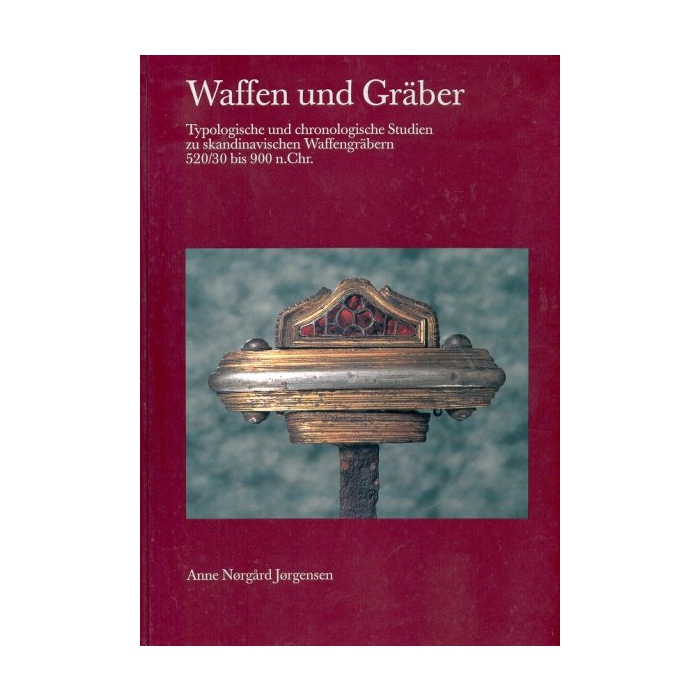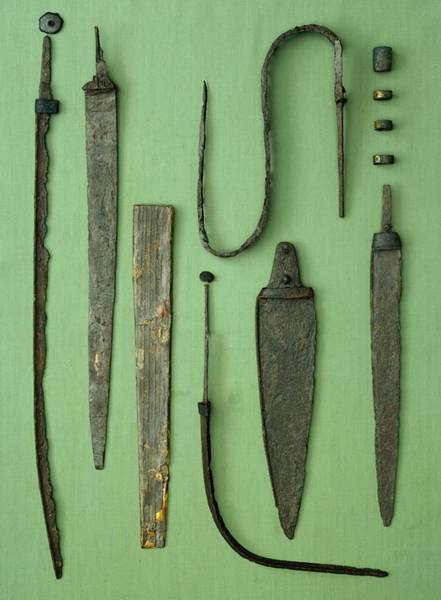Source: https://www.academia.edu/10277082/Weapons_Armament_and_Society._The_Pre-Roman_Iron_Age_on_Zealand_and_in_Scania
Martens, Jes
Weapons, armaments and society. The Pre-Roman Iron Age on Zealand and in Scania.
Page 147-174
In “The Iron Age on Zealand. Status and Perspectives“ (2011)
Edited by Linda Boye
Nordiske Fortidsminder. Series C, Volume 8.
The best preserved two-edged weapons is shown on page 152 and the (c) picture is the sword from Lindholmgård Mose.
Single-edged swords on page 153.
Here is a big picture of the Lindholmgård Mose sword (with it's pommel) and scabbard: [Here is the picture upright - the attachment below is the same picture just flipped to the right].
Source: http://samlinger.natmus.dk/DO/1885
[ Linked Image ]
Page 162-168 discusses a new Sword typology based on the Pre-roman Iron Age swords assemblies found at Hjortspring and Krogsbølle.
The original drawing of the Lindholdgård Mose sword should be this article (though he states the drawing on p. 152 (c) should be an article from 1949, whereas in the references it must be this 1950 paper):
Klindt-Jensen, Ole (1950).
Foreign Influences in Denmark’s Early Iron Age.
Acta Archaeologica XX, p. 1-248.
NB: Should be figure 15.
The find is also discussed on page 55 & 78 in this publication, which luckily I own:
Liversage, David (1980).
Material and Interpretation. The Archaeology of Sjælland in the early Roman Iron Age.
Publications of the National Museum.
Archaeological-Historical Series I, Vol XX
“E2. Lindholmgård, Uvelse Parish, Lynge-Frederiksborg Herred 33UUB2892.
A very fine iron la Tène sword with bronze guard and hollow silver knob at pommel, which was found together with its bronze scabbard at depth of three feet during peat cutting in 1888. One of the earliest occurrences of silver in Northern Europe.
Klindt-Jensen (1950) fig. 15 NMK. C 6131".
"The blade was three-ribbed in section and blunt-ended with a slight central projection. The concave grooves of the blade were ornamented with punch marks. The guard was mounted with an ogivally-arched plate, and the grip of the organic material (now vanished) had been embellished with two narrow bronze bands bearing a zig-zag pattern. The Iron tang ends in a projecting point, and it was presumingly on this that the little silver globe, which belongs to the find, had its place."
“The sword had been deposited inside its iron scabbard, which consisted of two plates, of which that in front was bent around at the edges to enclose the one behind. The scabbard ended in a straight bronze chape, and was carried with the help of two suspension loops of iron, affixed at different heights on opposite edges of the scabbard."
Liversage brings attention to a similar sword and scabbard also with a silver globe at the pommel.
The grave 26 Harsefeld sword; where he gives this reference.
Wegewitz, W. (1937)
Die langobardische Kultur in Gau Moswidi, (Niederelbe) zu Beginn unser Zeitrechnung.
Die Urnenfriedhöfe in Niedersachsen, Band 2, Heft 1/2, Hildesheim/Leipzig.
Also the Grossromstedt sword should be close in type.
Eichhorn, G. (1927)
Der Urnenfriedhof auf der Schwanze bei Grossromstedt.
Mannus-Bibl. 4 Leipzig.
He ends disputing Klindt-Jensen (1950). "The Lindholmgård sword cannot have been a Celtic import.........as its parallels lie north of the Celtic area and date from after the fall of the Celtic civilization".
Liversage (1980) doesn't have a picture of the Lindholmgård sword, but instead of the Tissø sword (p.79) -> that picture is reproduced on page 152 (b) in the Martens article referred to at the top.
So hopefully Liversage gives some information for a reproduction by those who wants to.
In his great four-bind volume of “Danmarks Oldtid“ (2004, 2006) Jørgen Jensen gives the total length of the Lindholmgård Mose sword to 85 cm (Bind 3, page 173). That was actually a bit longer than I thought compared with the length I calculated from the Liversage picture of the Tissø sword given below.
Tissø Sword: Total length ~70 cm.
Based on the image of the Tissø sword in Liversage I guess that blade is ~55 cm to the small guard and ~60 cm to where the hilt begins. Then ~10 cm hilt.
La Tene Sword - Lindholmgård Mose.
Source: http://samlinger.natmus.dk/DO/1885 [ Download ]

